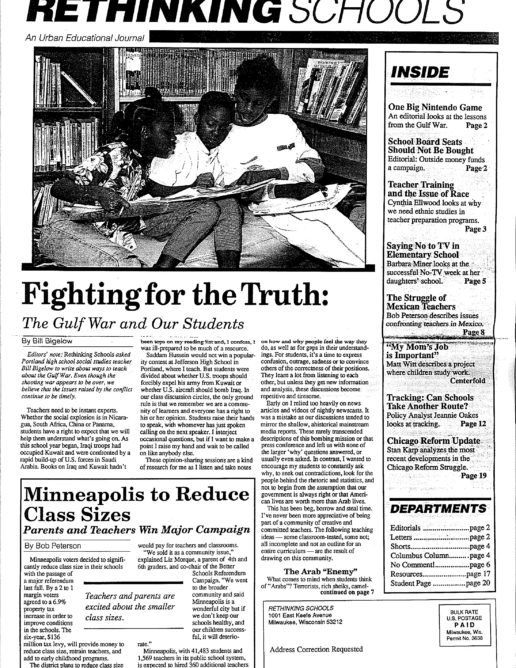One Big Nintendo Game
In a USA Today poll March 2, President Bush garnered a 91% approval rating, a resounding endorsement of his war policies against Iraq. Indeed, the initiation of the air war on January 16 and of the ground war 39 days later brought widespread support for the unleashing of U.S. military force.
Amid the red, white, and blue banners and the yellow ribbons, the resurgent national pride and relief that so few Americans died, it will be hard to challenge the U.S. policies that led to the war.
But we feel compelled to raise such a challenge.
We are saddened that a large majority of Americans acquiesced in or enthusiastically supported this war. Sanctions and negotiations offered a chance to reverse Saddam Hussein’s aggression with as little suffering as possible. Yet these options were abandoned in favor of a brutal conflict which has left at least 25,000 to 50,000 dead Iraqi soldiers and a land ravaged by more tons of bombs than were dropped over the entire span of World War II. The number of civilian deaths will never be known and is sure to escalate due to the destruction of the Iraqi water, electrical, transportation, and sewer systems.
Widespread outbreaks of typhoid, cholera, and other deadly diseases are expected.
We condemn Iraq’s invasion of Kuwait and are revolted by reports of the torture of Kuwaiti citizens. But the US government indulges in self-righteous lies when it claims that our military action was based on commitment to national sovereignty and human rights.
Instead, the war was based on the desire to control oil reserves and assert U.S. hegemony in the “New World Order.”
It is daunting to consider the lessons we have just taught our children; lessons which contradict what they most need to learn.
We need to help our children develop a passion for justice and a capacity to reason critically. Yet media reports bombarded us with military briefings and bombing raids, while providing little analysis of the historical patterns of colonial domination and US policies that have shaped Middle East politics. The commentaries and debates our children encountered on the impending war were so bereft of intellectual and moral rigor that we deprived them of the chance to think deeply about the issues. And it is a sad reality that the schooling most of our children receive does little to help them develop the intellectual independence they need to wrestle with the challenges of controversy.
Our children need to have courage in their convictions. But they were given the example of anti-war politicians whose opposition crumbled in the face of the pro-war fever which gripped the country.
Our children need to learn that peaceful conflict resolution is nobler than violence. Yet we favored war over negotiation.
Our children need values which will not allow technology to cheapen human life. But we have given them weeks of carnage masquerading as a Nintendo game.
Consider the comments of a young Air Force captain, just after he bombed 23 tanks. “There’s nothing like it. It’s the biggest Fourth of July show you’ve ever seen and to see those tanks just boom and more stuff just keep spewing out of them and the shells flying out on the ground, they just become white hot. It’s wonderful.”
Finally, young people should learn to be critical of racial inequality and celebrate cultural diversity. But beneath the call to high principles which punctuated the Gulf war lay thinly concealed racial prejudice. Our young people saw how quickly we condone the slaughter of people of color. As we adorned our schools with yellow ribbons, little thought was given to the young Iraqi men lying dead in their trenches, or the Iraqi children crushed inside the ruins of bomb shelters.
The moral blinders which made it easier for the U.S. public to accept the slaughter in the Middle East are rooted in the most sorrowful episodes of our nation’s history. The African slave trade, the genocide against American Indians, the war of “Manifest Destiny” to annex one-third of Mexico, the incarceration of Japanese-Americans during World War II were all justified by racist assumptions. Current U.S. foreign policy, while more subtle, is fundamentally no different.
As long as our students remain oblivious to the culture and experience of other peoples, and unaware of the vulnerability of other countries to the actions of our government, they will remain captives of a national chauvinism that blunts their moral sensibilities.
As educators, this first lesson in the “New World Order” confronts us with difficult questions. How can we balance our students’ need to learn from our values with the need to form their own? How do we maintain the courage to voice our convictions when this might cost us censure or even our jobs? How do we challenge the racism, national chauvinism, and lack of concern for non-American lives that fueled Operation Desert Storm?
As the rubble and bodies are cleared from Kuwait and Iraq, these are questions educators must face.

